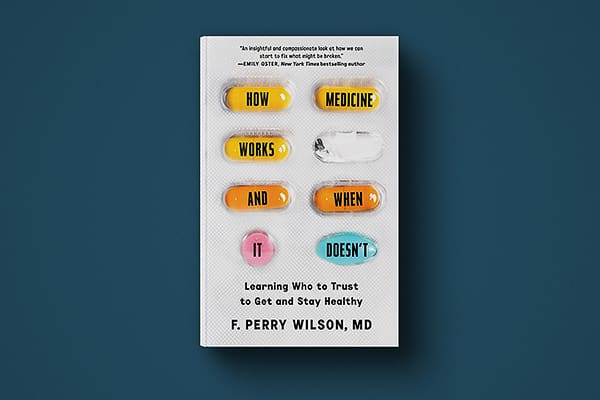
A new book entitled How Medicine Works and When It Doesn’t by a Yale University physician and researcher, Dr. F. Perry Wilson, focuses on how patients can make better choices for their health. Dr. Wilson’s advice goes beyond the basics of “talk to your doctor,” and delves into what factors may influence patients’ abilities to make rational decisions about their health and instead make choices that can turn out to do more harm than good. He explores the power of the media on our medical decisions – how we can avoid being influenced by the latest “breakthrough” – and how to know if a study being discussed is merely showing correlation or causation.
Book Draws From Dr. Wilson’s Experience
Dr. Wilson’s book opens with a personal account about his failure to help a patient. As a young resident, he describes interacting with a woman who came to him in despair, desperately seeking a diagnosis for her ailments after having seen numerous doctors over the course of several years with no definitive clinical finding for her suffering. After his examination, Dr. Wilson explains to the woman that he believes she is suffering from major depression. He goes on to say by the immediate look on her face and her silence, he knew right then that she had lost hope — “Right there. That’s when I lost her,” he writes.
Dr. Wilson goes on to say that he next sees this same patient a year later, having a seizure in his emergency room due to a “water cleanse” gone awry, yet stating that she “had never been happier.” This personal narrative is an effort by Dr. Wilson to convey to his readers the central thesis of his book – that our susceptibility to medical misinformation stems not from ignorance or gullibility, but from the large-scale failures of the medical system itself. In a world of five-minute primary care visits and $5,000 ambulance rides, Dr. Wilson argues, is it any surprise people will turn elsewhere – even to complete strangers on the internet – for help?
Dr. Wilson Challenges the Healthcare Establishment
In his book, Dr. Wilson challenges the healthcare system, blaming much of the recent discord between patients, doctors and public health officials on structural issues that ultimately result in the suffering of patients. Chapters on big pharma and health insurance companies figure prominently into a narrative that makes every effort to convey to readers exactly why so many people feel that they aren’t really being taken care of.
“The most powerful force in Medicine is trust. It is the trust that lives between a patient and a physician, and it goes both ways.” — Dr. F. Perry Wilson
In the end, Dr. Wilson reminds patients and doctors that they are both on the same side – part of a great “therapeutic alliance” – a battle against disease, disability, pain and suffering hinged on a relationship of trust. And that through rationality, empathy, understanding and critical thinking, we can work towards rebuilding that trust that makes that alliance successful.




